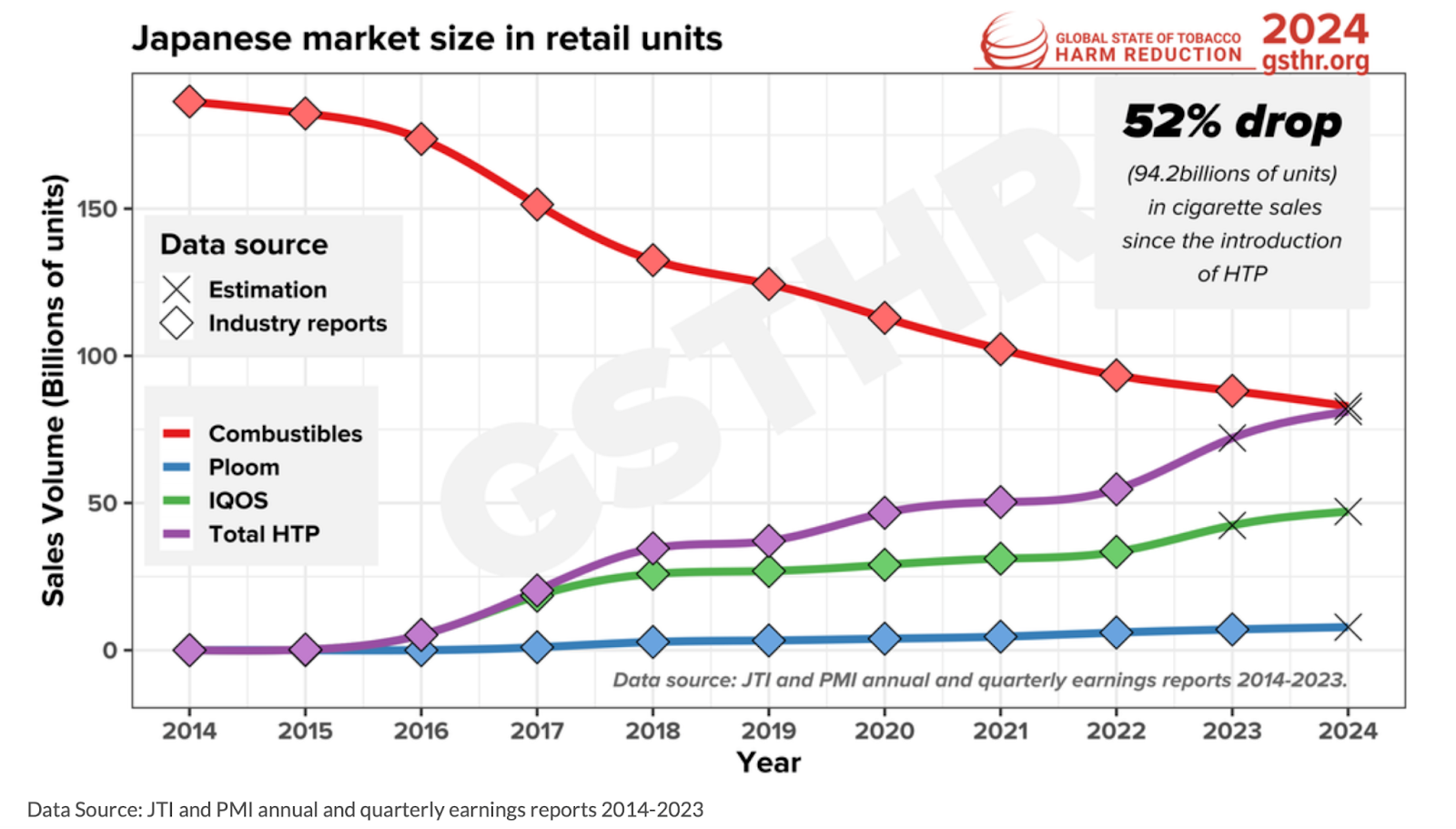Cigarette sales have halved in Japan since the introduction of safer heated tobacco products just a decade ago, a new report has found.
The briefing paper ‘Cigarette Sales Halved: Heated-Tobacco Products and the Japanese Experience’ by smoke-free action group ‘Knowledge-Action-Change (K-A-C) reveals how quickly the Japanese public have embraced the adoption of safer nicotine products (SNP).
The report shows that the sale of cigarettes in Japan dropped 52 per cent from 182.34 billion in 2014 – when heated tobacco products (HTP) first became widely available – to 88.1 billion in 2023. That’s a massive fall of 94.2 billion per year.
Meanwhile, in the same timeframe, the sale of the tobacco sticks used in HTP rose from virtually none to 62 billion.

What is HTP?
When a conventional cigarette is lit and smoked, the tobacco burns at temperatures upwards of 800°C. The combustion of tobacco releases nicotine and a cocktail of harmful chemicals in smoke, which is inhaled by the user.
HTPs are battery-operated electronic devices which heat sticks of tobacco to a temperature of no more than 350°C. Heating tobacco to this level causes nicotine to be released, but the tobacco does not combust. This means the level of toxic chemicals in the resulting vapour is much lower than in cigarette smoke.
What about vapes?
In Japan, it is illegal to sell or buy any nicotine-containing e-liquid, or to use or possess any device that uses e-liquids. This includes both refillable and disposable vapes.
Therefore, there have been no other nicotine alternatives to compete with HTP in Japan.
Other societal and cultural factors
The report says there is “a range of societal and cultural factors” that meant HTP was particularly likely to prove successful in Japan. It says Japanese people are keen adopters of new technologies and are also motivated by a desire to reduce their impact on their fellow citizens.
It points to the Global State of Smoking Poll 2019, by the Foundation for a Smoke-Free World, which found the most common reason Japanese smokers switched from cigarettes to HTP was concern about the health risks to others associated with second-hand smoke from cigarettes (40 per cent).
This was followed by 36 per cent who said HTP may not be as bad for their own health, and 35 per cent who said they could use HTP in places where smoking was not allowed.
Former smokers felt HTP is less harmful
It says that peer-reviewed scientific research has also assessed the reasons both current and former adult smokers are using heated tobacco products.
One study found that the belief that HTP are less harmful to either themselves (90.6 per cent) or others (86.7 per cent) was the most important factor.
This was followed by personal enjoyment (76.5 per cent), while 74.4 per cent said HTP use was more socially acceptable than smoking cigarettes. Among current smokers, 55.1 per cent said they used HTP in the hope they may help them quit smoking.
What it could mean for other countries
According to K-A-C, the success of HTP in Japan offers significant hope of their potential to cut cigarette sales in other countries.
“The speed and scale of the change in Japan shows just how quickly things can improve when those people already consuming nicotine are given access to a safer alternative,” said K-A-C Director David MacKintosh in a statement.
“This is not the result of a specific government policy or initiative, yet the benefits to individuals and society are significant. There are lessons to be learnt from Japan by all those who wish to see the use of combustible tobacco consigned to the history books.
“Harm reduction is about giving people the opportunity to improve their own health and the health of those around them. Given the chance, most people will do just that.”
The report concludes: “The situation in Japan demonstrates that if SNP are made widely available and are allowed to be promoted to adult smokers as a safer alternative to smoking, then many smokers will make that switch, or reduce their consumption of cigarettes through dual use, with all the benefits that brings to public health.”



